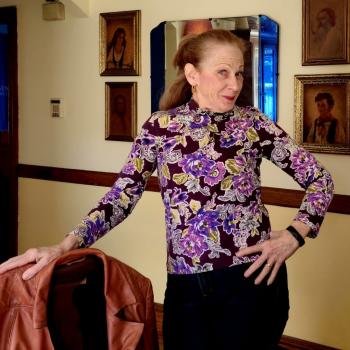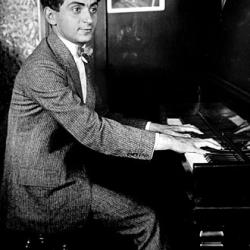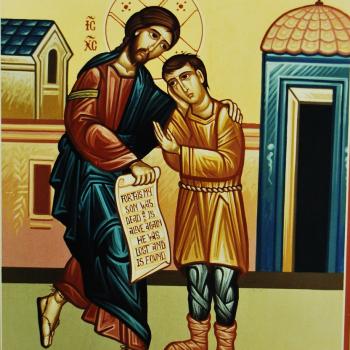From my earliest involvement in modern Antinous-devoted spirituality, I've identified my practice as (amongst several other adjectives) "reconstructionist" because I have found the remains of ancient temples, statues, coins, historical and literary texts, and sacred hymns to be revelatory of what the god Antinous is like, and has been in the lives of his worshippers in earlier eras. I've had some people deride me for this: some say that paying any heed to what happened in the past is done at the expense of getting a good feel for what Antinous is like now as a continuous and present divine person in people's lives; and, I've had others who are of a particular reconstructionist-identified bent that also critique me for worshipping someone who was formerly human.
I find that dismissing a person's entire history and family background as the basis for valid knowledge of the person as one encounters them now being inadvisable (at best!) is a very valid counter to the former objection. Just as we have individual and personal histories, the gods have individual and personal histories (outside of their mythologies) as they have interacted with their human devotees over the centuries, and these do not go away simply because we may not be interested in investigating them, any more than someone who doesn't care that I'm from Washington State will not remove my Washingtonian-ness from me in our interactions due to their lack of interest.
As for the latter critique, it is patently obvious that the ancient Mediterranean peoples, and those of wider Europe—from Greeks to Romans to Egyptians and beyond—worshipped and gave cultus to particular former humans all the time, whether they were heroes, deified rulers, or honored ancestors. Just because a particular religion put especial emphasis on a certain former human (and didn't even agree quite often on how "human" that individual was!) doesn't invalidate the concept of taking human deification and apotheosis seriously. The same reconstructionists who would scorn my worship of Antinous would probably also scorn my attention to anything that cannot be traced reliably to a time earlier than the birth of Alexander the Great, in many cases.
But, my intention here is not to stir up further division between different types of reconstructionists, but instead to expand upon the methodology involved in reconstructionism—because it is a methodology, not a religious identity, in my view—and to investigate what I see as a kind of dimorphism that is occurring within reconstructionist-identified communities and individuals.
You will note that my title here privileges "passive" as the first term, rather than "active" being first, as would most often be the case when this type of dichotomy is raised. I have done so in this case because I find the "passive" version of this dichotomy to be far more common and widespread, to the point that it is even synonymous to a degree with "reconstructionism" in many people's minds, both within and outside of the communities and individuals concerned.
So, firstly, what is a "passive reconstructionist"? A passive reconstructionist is someone who employs the methodology of reconstructionism in a manner that involves doing a lot of research (whether direct or secondary), seeing the structures, ideas, practices, and frameworks that were involved in the practice of particular premodern religions, and then re-enacting and re-creating those as closely as possible. This is the basis of reconstructionism in most of its currently practiced forms, and anyone who is involved in reconstructionism has done this to some degree or another. Without it, reconstructionism of any sort would not be possible. It is really essential to do passive reconstructionism, therefore, in order to identify as a reconstructionist-employing methodologist at all.
And, it isn't enough.
And this is where I would make the distinction between an active reconstructionist and a passive reconstructionist. Once one starts using the practices that have been recovered through passive reconstructionism, if the deities involved respond in real and viable manners, then things will begin to change. Adjustments will be made, adaptations will start to occur, and innovations will begin to emerge. These changes will be on the initiative not only of the gods involved, but also on the part of the humans involved, and if they end up working, then they'll persist.
To use two analogies from human life with which we are all probably familiar:
1) No one enters into a long-term romantic relationship, persists in it for several years, and is the same person in the midst of that length of time passing. We are all in a constant state of change and (hopefully positive!) personal evolution, and have an increase in knowledge and our capacities to feel and to experience as we evolve in these ways. Doing this in constant contact with another individual means that the mutual processes of development will influence each other. People "grow together" in this way, not only entwining their individual and separate lives ("growing together" as in "becoming fused"), but also in increasing their own abilities and stores of experience ("growing together" as in "expanding at the same time and in the same space").





